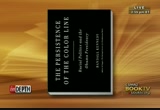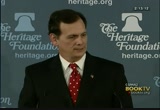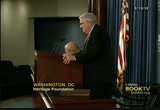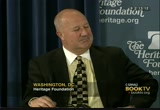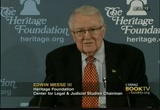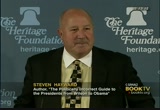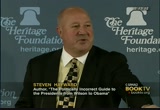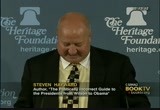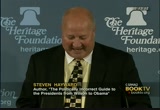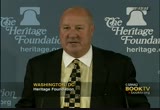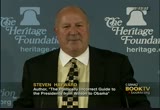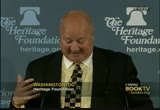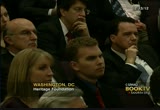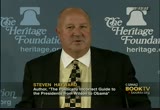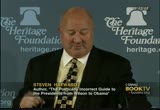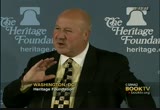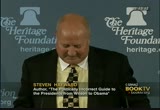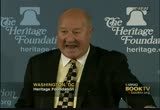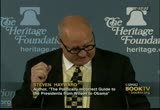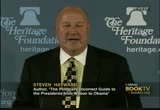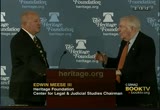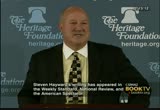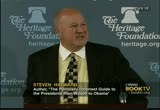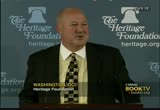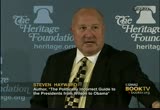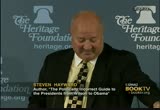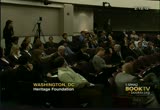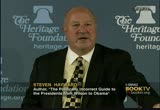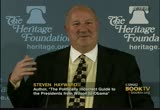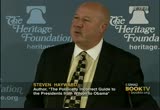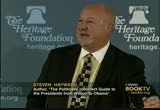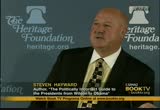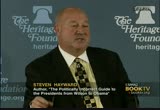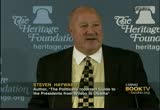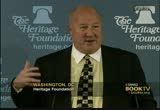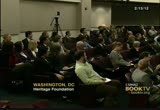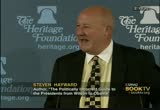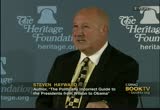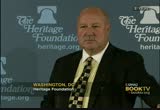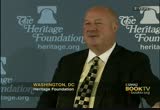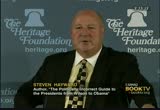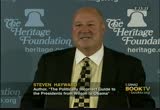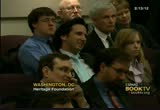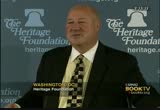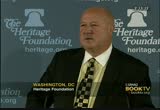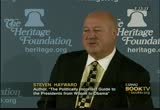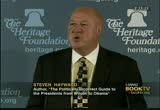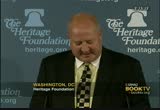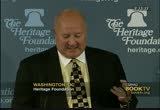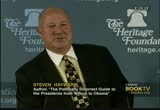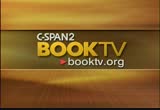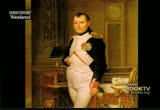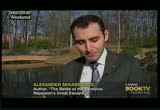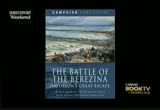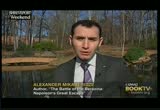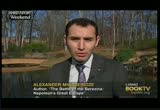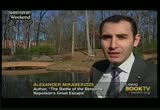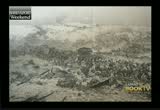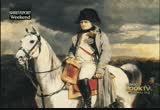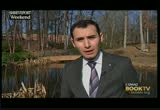tv Book TV CSPAN March 4, 2012 3:00pm-4:00pm EST
3:00 pm
3:01 pm
we would ask everyone here in houston should be so kind to make that last is a check that your cell phones have been turned off as we record the program. we'll post the program within 24 hours on our website for everyone's future reference as well. as you notice we do have copies of "the politically incorrect guide to the presidents," partisan at least. available in the lobby if you would like to purchase them. we, of course, this is part of a long-standing series the publishers have done various aspects on issues of interest to all of us we encourage you to consider them. hosting our discussion and it is our special guest will be edwin meese. he served as the ronald reagan distinguished fellow in public policy. he's also chairman of what is now the edwin meese center for legal and judicial studies here at the heritage foundation. please join in welcoming the 75th attorney general of the united states. [applause]
3:02 pm
>> thank you, john, and thank you, ladies and gentlemen. is a pleasure for me to be here today, particularly to introduce today's special guest and our speaker. steven hayward, i consider one of the best writers in the conservative movement. he has done some outstanding work. he is a senior fellow at the american enterprise institute. as you know, one of our companion institutions in washington, d.c. here with whom we do a lot of work including recently cosponsored one of the presidential debates. he contributes to 80 eyes energy and the apartment outlook series. she's the author of a book entitled the almanac of environmental trends, and he also, and i think one of his greatest works has been two biographies, two phases of ronald reagan's political career and ronald reagan as governor of california and ronald reagan as president of the tranny. he's also done biographies of
3:03 pm
jimmy carter and winston churchill. he has a distinct background reduce active in a number of organizations including the pacific research institute. he's had a great deal of experiences, a bradley fellow, here at the heritage foundation and also has done a number of things, including being a member of the california citizens compensation commission, and in various other academic pursuits. but today for our purposes he has done a particularly important thing, and that is look at the modern presidency, that is from woodrow wilson through the presidency of barack obama. one of the things he has done is looked at it from a different angle than most be writing about president. he has looked at from the standpoint of how have presidents done in regard, particularly in the modern era, in regard to what the constitution and the founders had in mind for the presidency of the united states.
3:04 pm
this distinguishes him from a number of the people who have done biographies of presidents or who have looked at presidents and evaluated them as he has in this particular book. it's not only an excellent book from the standpoint of its scholarship but it's a very entertaining book. i urge any of you who haven't purchased it before, you have the opportunity as john pointed out at the conclusion of this session. so please join me in welcoming a good friend of heritage and a very important part of the conservative movement, steve hayward. [applause] >> well, thank you, general meese your general meese try to persuade me from this. it's likely impossible i be -- i will be able to get through this whole talk without referring to my favorite theme, namely that ed meese was the greatest attorney general ever and we
3:05 pm
ought to talk them into suiting up again for that job, if we could. it's been a delight to contribute the latest on and the regular line of politically incorrect guide, or pigs as sure. it gives a whole new meaning to taking out. but there's a couple of obvious threshold questions which general meese has suggested in his introduction. what could be a politically incorrect perspective and about the presidency? one of the great american institutions, right? how could that be politically incorrect? and second related question is why start with woodrow wilson and not do all the presidents from george washington on? glad you asked. there are two main arguments that are closely connected, and a couple of important ancillary parts you're the first access is that there are two presidencies. there's the presidency as the founders conceived it, and as most of our presidents practice
3:06 pm
the institutions of the 19th century, and then there's a modern presidency. that i argument against the size of the with woodrow wilson. you can make out that theodore roosevelt lake in some aspects of the modern presidency and i comment on it briefly in early introductory chapters but it's woodrow wilson redefines i think the modern presidency in its most important respect. in the second axis of the book is that most, not all but most of the leading books and treatment of the presidency, either the people assert any office or the institution itself, or both, are actually defective in some profound and consequential ways. if you look at most a modern textbooks that but using colleges and universities or the leading trade books that are crossover between college books and for a general reading audience, if you look at most of the leading books you see that most of them tend to treat the presidency as though it were just another ceo position. albeit with a corporation, the u.s. government, that is more
3:07 pm
complicated and byzantine than ibm, or apple i suppose. eating aspect of the presidency and most of the modern books is on the idea of leadership with a capital l. along with some personality traits of the president. so for example, just take two of the leading books that are still in print and widely used. the presidential character, a book that is gone for four additions since his first published in 1972. the authority book in a lot of ways. different presidents and different character traits they had and have it served them for ill or for good. there's a lot to learn from the book. i don't want to say it's a bad book. it's not, it's a good book but there is something missing. if you open to the index of the presidential character, you will not find a single index entry or constitution or any of its, like constitutional or constitutionalism. sort of startling if you think about for a moment. or take presidential power and
3:08 pm
modern presidents, again another interesting books with lots of interest material, gone to many addition since his first published back in the '60s. also has no index entry for constitution. not just index. if you go to the text if i know discussion of the article to article ii really beyond a couple of their instrument things. and no substantive discussion. the constitutional dimension of the president, and so don't get a discussion of statesmanship from these books but as i say they make the presidency into another executive office, albeit one with fancher bells and whistles. the presidential difference, leadership style from fdr to clinton, again another good book. also know discussion of the constitution. what this approach reflects is the modern value free social science approach of political things that have largely ruined academic discount of political science and is well on its way
3:09 pm
to ruining the academic discipline of history as well. that are some exceptions to this. a couple of mention in the book, presidential greatness is a pretty good book on some of these questions. i think the very best book, one that is now almost 20 years old but still very much worth reading is forced mcdonald's book the american presidency, and intellectual history. it's probably the best book written by one of the great conservative scholars of modern times, forced mcdonald's or then there's the curious outlier in all this and that is arthur schlesinger's most famous book the imperial presidency. there he argues we need to bring the president back inside the constitution. he talks about reinvigorating the separation of powers. but, of course, it's licensure wanted to -- having been championed before that, suddenly schloss, suddenly schlesinger was shocked to learn people like lyndon johnson and richard nixon could do the presidency in ways he didn't approve so we thought it was time to let the congress
3:10 pm
to become the preeminent branch can. so even there a book that is on the right track, was on the right track for the wrong reasons for wrong objects. it's possible to judge presidents buried on an ideological scale. we have all these rankings and polls come out from time to time, and they put presidents in categories of great company are great, average, below average and so forth. you can do that. mostly that reflects the policy preferences of the people who are responding to the surveys, for the most part. but i think there's a simpler and more direct method that allows you to abstract of policy choices and is more useful in relevant. that simple message is to take article ii, the article that defines the office of the president, and in particular look at the oath of office that the presidents' day. article ii is vague in some respects, a lot of terms that need to be defined and practiced
3:11 pm
by the occupancy office starting with george washington, one part, one act is specified in article ii that all presidents take the oath of office, the oath to preserve, protect, and defend the constitution of the united states. so i had a simple idea. i'm not sure i would call if he were to raise or not but the idea was to say how do they live up to that oath of office? and i divide the three-part test from this. the first part was that the president have a well-developed constitution philosophy that informs their choices and policies, especially their public rhetoric? in other words, their teachings to americans about the constitution. one thing i observed in the book was all the president's to the founding to the end of the 19th century and a couple in the 20th century, if you go back and read there and argue addresses, about half talked about the constitution. reminding citizens of our constitutional heritage as a principle behind it.
3:12 pm
that practically ceased in modern times with the notable exceptions of harding, coolidge and ronald reagan. the constitution seems like an afterthought or a perfunctory mention, let alone other speeches that presidents get. that's the first when it did have a constitution philosophy and did they share with our system. second is the of their actions and office support or undermine the constitution? especially its limits on centralized power. then third, i decided to judge presidents according to the supreme court picks. something no one ever does. but remember, presidents get to shape the judiciary almost exclusively, with the advise and consent of the senate. but that is often the most concrete and long lasting affect presidents have after they leave office. still have a couple of franklin roosevelt's pointing serving on the courts in the 1970s. so almost none of the books on the presidency of the talk about
3:13 pm
this very much, or talk about the constitution legacy and how it outlives the presidency. and then one of the important, several aspects one of the important ones that completely puts the idea is that presidents today in modern times simply talk too much. they talk to us costly almost daily in the directly or through their spokespersons in the daily briefings and so forth, statements the present issues almost every day. and someday it may occur to a president that once secret of preserving public support would be to talk less to embrace less is more principle. among modern presidents there's only one who really understood this. i think reagan understood it but notice the gray communicate at the table time, he talked a lot. i think he would have liked to talk less and it's important
3:14 pm
that general meese can fill in details about this, he often turned away suggestions from the staff that he gave another speech, going tv again for this project to i think understood there were limits. but the president who rarely got it was dwight eisenhower. dwight eisenhower didn't like giving speeches, and when he did give them he wanted to keep them short. one of the courts i have in my book is eisenhower telling his advisers quote i keep telling you i don't like to do this sort of thing. i can think of nothing more boring for the american public advocacy and their living rooms were whole half hour looking at my face on their television screens. another time he said, what is it that needs to be said? i'm not going out there just to listen to my tongue clatter. he said all right, but not over 20 minutes. if you go back and compare, i can do all modern presidents with the earlier ones, the great book on this is the rhetorical presidency.
3:15 pm
george washington averaged three public speeches at year. john adams, one. thomas jefferson, he was positively verbose i guess i speeches a year as president. james madison, zero. george will has a great joke about this. the british side washing, burn down the white house and he still didn't give a speech last night even andrew jackson who was out with good reason to introduce an element of type living with the presidency, even he didn't make a lot of speeches on a public speeches. he gave one a year. then the third point, answer point is this idea that our president should be leaders with a capital l., taking americans to new and undefined places they didn't even know they want to go. that was the explicit teaching of woodrow wilson.
3:16 pm
before very long to start getting a premium being placed on charisma and our president, right? most famously kennedy of course. so now the presidency is this institution we think of the apex of american politics even though i think the presidency should be thought of as a branch of government. one store, some controversy, if you go back to the late 19th century, thomas reid, the legendary republican speaker of the house who thought about running for president, and he said no, he thought president with lesser office and the speaker of the house. sometimes have a thought experiment of suggesting that fought to newt gingrich from time to time. [laughter] well, so that i ghana give letter grades all the present. i will go on much longer. so i cradled the presence from wilson to obama, a nice 100 year
3:17 pm
mark. wilson gets an f. east the first president to criticize a constitution opening, to say ought to be replaced. i end up getting five s., wilson, fdr, lyndon johnson, jimmy carter, bill clinton and obama. that might be six actually. i miscount a. i didn't grades on a curve. barack obama turns out to be the perfect at the god of woodrow wilson. like wilson, he doesn't have much regard to the original principles of the constitution. i almost feel like i needed to a second edition already just because the last couple of weeks, but last week matt lauer of nbc news asked why haven't you given us all this grand helping change a promise? obama's answer, i'm really to, quote, it turns out our founders designed a system that makes it
3:18 pm
more difficult to bring about change than i would like. [laughter] it turns out, he's just now discovering this now? robert is here today. he said to some of professor obama's classes at the university of chicago. i point out a scholar of constitutional law actually taught the equal protection laws. his favorite cause of course in the constitution, he seems to just get over the separation of powers of the constitution. and so i in the book by saying that the modern presidency can really be said to be done with the results of the 1912 election which saw the party splinter, and that mark a new chapter in american political, that liberals was built on but to me republicans for choice followed this slipstream. and in the best of all worlds election of 2012 could mark the
3:19 pm
end of this chapter, and a return to a boulder, sounder constitutional order if american voters would take to heart the wisdom of the founders. and so i will stop there and i will look forward to questions and comments. and i have held back, general. >> thank you very much. [applause] >> that's a great start, which i'm sure will provoke a number of questions here. i'm going to ask the first one while others are thinking of the questions. and that is, it seems very certain parallel between the size of the white house staff and what you might call the institutional aspects of the presidency and the so-called modern presidency. would you comment on that? and what happened with woodrow wilson and where did everything
3:20 pm
grow? in my own reading, it seemed to me that the ideas grew with wilson but it was roosevelt who really put the institution mechanism in place. would you comment on that? >> i think that is a pretty good place to start. i think the problem with a capital l. leadership model of the presidency, let me see -- when you get the federal trade commission started under wilson, the federal reserve, that's a semi--- what happens in this modern model is the president is expected to be at the apex of solving all these problems, and so we do is, what happens in the white house now, you really see with obama with office hours, white house special assistant for x. problem, is that the white house is now implicated in trying, the president isn't located in trying to sell all of our problems. whenever a new problem comes along you start a new white
3:21 pm
house task force and/or you proposed legislation for congress to set up an independent agency or expand an existing independent agency with a new mission. dodd-frank extended with the security and exchange commission will have to do your the problem here from an organization point of view seems to me, and this is where the standard textbook model of the present i think could shed more light than they do. is you're expecting too much of a president and an executive agency. talk to anybody any white house, of either party, and what they would tell you is the water and white house is kids. one thing after another every day. there's not much time to think of anything. a lot of things fall by the wayside or could have done. we are expecting our president to have to stand on every problem. this is why the most modern are the ones that country on what's essential. ronald reagan conjuring a three or four things. partial exclusion of most other things.
3:22 pm
letting the government go about its business instead of trying to be at the center of everything. were as the presidents were into every problem, jimmy carter, we 300 pages a night of memos from his staff until two or three in the morning. the presidency can't set priorities or try to be in on everything tend to be less successful. this is a problem to the skillet government but is also a problem of executive model that is seen the white house staff grow from a total of five under president grant, and i think 27 under mckinley, and now it's really over, the white house staff has several hundred people plus 3000 people you point to a senior and ranks of executive branch. so did the math on that. if you appoint, i think if you put three people and our, 24 hours a day from election day on, it takes you to june or july to fill all those jobs. that's also practical.
3:23 pm
even if there's no confirmation to any of them. this is why we now can't even step the government very well in more. we're simply asking president to do way too much. >> let's open it up to questions from the audience. >> one of the presidents, bill clinton, has said on more than one occasion that the american people are rhetorically conservative that operationally progressive. is there anything to this? he wasn't the first person to say that. i'm not sure if george will and grace the. i know he passed that theme along. and this is a profound -- a profound modern political problem. in that the liberal theory that you divide people up into special interest groups and administer their needs make them supporters of the state.
3:24 pm
i don't know if you saw a little bit, "the new york times" yesterday had a terrific front-page story. the interesting story about how more and more middle-class people are relying on the safety net even as they dislike it. the times is deploring this. the article as they say in journalistic circles have these wonderful charts, the times graphic is good at this. it's shown growth in entitlement spending spending from 1960 in real terms just taking off like a rocket to everything else being pretty much flat. with the partial exception of education which is gone up is gone up and is now the second most amount of money spent by all levels of government. so i thought that was interesting, in that the times article goes on to explore the fact that a lot of people, you know, the bitter claims as our
3:25 pm
current president would have said, just like in time a state or critical of critical of the government. and if you ask them should these programs because, they are more hesitant about that. for a variety of reasons. some artifacting edge of these programs right now in a bad economy, and others superficially decent reasons that you worry about what effect might have on people who really do need them, right? so that is where there is a dissident, keeping two conflicting ideas in your head at a time. that's why we see a brave person like paul ryan, with a series plan to try to turn this around, and it's a big firefight. that's got a long way to put out. everything does depend on and to that eventually. >> so my question is one of the things you said is that the presence speak to much. given the social media land that
3:26 pm
we all live in now, what do you suggest they do choose go back on that, and would have been cut into transparency which has also become an issue? >> that's a great question. it would take considerable discipline, the discipline of a general eisenhower to say i'm going to speak less. except remember, eisenhower, modern president, i is not it's one of the most popular. only ronald reagan comes close to him. it's probably not an accident. that he was not in our face everyday and prominent -- promising us the movie it would take iron discipline begun think i think would be interested, here's a challenge for conservatives, as a topic. >> you could envision mitt romney winning the election but no one is very enthusiastic about the guy. the good side of that would be is if conservatives put more attention on congress as a place to get our national leadership. our model for the last 40 years
3:27 pm
has been great, if you get a conservative present for a semi-concert president and you run to the white house to the meeting was something going wrong and you want to present, that's the liberal model. instead of expecting our help to come from the white house, we instead spend more time and attention on congress. that used to be the conservative view. if you go back to 1950s, look at the conservative political scientist historians, they were all saying liberals but all the chips on the president. and we should. there is a reason that article i is about congress. that was supposed to be the preeminent of the three branches for moving the country law. and the most limited branch. so this would be a return. what i'm is just would be a return to the older conservative attitude about how you should regard the relative priority of the three branches of government. so, i don't know, it's almost irresistible for a president with all the tools that are available, you have the command
3:28 pm
of tv networks, the internet, it's almost irresistible to comment on things every day. i don't expect that from anybody, fortunately. you might be able to expected from romney, he's really smart, but we will see. john? >> following up on that, is it not the context in which they are speaking? so much has now become a stage presentation that there is not a back and forth which is more the transparency issue, my question time and comments. is it a matter of the venues they are using as opposed to being effective communicators on what the issues may be ordered some of that setting might affect it, too? >> that's an interesting question, because it would be very hard to ask any president today what i'm suggesting here on a wholesale way.
3:29 pm
because what we do nowadays is expected our is to rally the country in times of trouble or to address certain problems in the country were even if there's not a political solution we like hearing from our top person. so, think of ronald reagan giving speeches around the country on -- there's a certain amount of that is always going to happen. the dividing line between what's that role, genuine national leader, and sort of political role which i think you can criticize president obama for being in today, that's harder to make out. i think i can maybe ronald reagan is a good model. may give lots of speeches but there's also speeches that still stand out. in ways that's hard to think of many speeches since danny out in the same way. you think of the evil empire speech, followed three weeks later by the defense initiative speech, along with parliament,
3:30 pm
five speeches of reagan that look back now are important. the westminster address and finally the wall street speech and 87. those really stand out. the president is contrary a something that is really important, and not just saying something new in all cases, right? that's how you make news. you say something new. president bush, the second president bush after his election, reelection 2004 try to go around the country giving speeches on the social security issue. it was already in deep trouble and dine before hurricane katrina completely deflected the administration off course. so there are limits to what you can do. if you're giving the same kind of speech, the problem of president bush, it was not catching on. obama is time to do the same thing right now. shows the limitations of all that. it's very hard to drop lines on those things and say what will work and what will. again, the reagan model is probably a better one but if you go further back and look at some
3:31 pm
tremendous speeches, especially in regard to the cold war story. marshall plan, the truman doctrine, those are changing the country's policy. >> i'm just curious can use of the modern presidency has become more like a ceo position in the 20th century. i'm just curious, what background do you think is best for the modern presidency? like for instance, met romney campaigns on, a lawyer, a soldier? diverse background, is it an ivy league school? what you think is the best background for the modern presidency? >> that's a wonderful question but i'm having fun right now pointing out that our last president had a harvard mba, current president has a harvard law degree, and mitt romney is elected he will have both. [laughter] there isn't sort of one, there may be a partial ones that question but there isn't a clear answer to it because some
3:32 pm
soldiers, eisenhower i mentioned. i generally think that people with pure business back on a probably not well suited to be president. why don't we get a business man? the best presents are ones of the executive experience on the state level, governors. and generals had executive experience that's what eisenhower looks like a governor in certain ways. and the poorest presidents are often ones who were senators are house members to most what they do is make speeches, they don't make decisions and are not responsible, solar responsible for things that happened under their purview. i think the most interesting presidents, i think you extend this to foreign leaders, too. are not the ones with conventional ivy league education. the ones of the unconventional education. and if excellence are largely self educated. so i would like to point out that, start with theodore roosevelt. virtue all of our presidents that have ip league educations
3:33 pm
are the ones who are elected of right truman and johnson are sort of accidents being vice president. but those roosevelts went to harvard. taft went to yale. herbert went to stanford. even jimmy carter was an outside figure i tended and applets. and richard nixon went to tiny whittier college. he goes to duke law school, becoming a wall street lawyer and is passed back to the white house. this is why ronald reagan is so interesting. a tiny ago place. more importantly if you study the reagan story, really close i think what you see is like harry truman, who didn't finish college, only modern president didn't have a college degree, they both owe their particular political imagination to the own self-education. reagan's case it's hollywood and traffic around the country for
3:34 pm
ge when he's reading the classics of the american cursive movement, he's reading and quoting speeches. is doing all that on his own. i think it's possible reagan could've been driven by conventional ivy league education. so that would be the most interesting -- harry truman read history on his own from a very early age one of the things he says unequal in my book, something like person sits here at this desk ought to at least know his american history. good for him. contrast sharply against, with the current executive who speaks of the 57 states, connected by the intercontinental railroad which may have even passed to the historically republican state of texas. when it wasn't occupied i marine. so i could go on on that subject. [laughter] i mean, the whole subject.
3:35 pm
>> al milliken, a in the media wondering how you have viewed, how presidents have used religious imagery and length, particularly the bible. what would you find significant? >> great question. i don't write a lot about that in the book with a couple of exceptions are one of the most interesting things is harry truman. a devout baptist. you won't find this in most of the big biographies about truman. good biographies, david mccullough, and they tread very lightly on his religious sensibilities to really find out the great story about truman, i mentioned this in the book, wrote a terrific book about harry truman foreign policy and development of what we used to call liberal internationalism. she flushed out much better than anybody, the fact that he regarded the soviet union as an evil empire because of their
3:36 pm
atheism, and talking about his disappointment that he couldn't get more church organizations involved in talking about the premises and principles of american foreign policy. he wanted the catholic church and all the major denominations, semi formal adjunct to american foreign policy, education of the american public and overseas. and so read the speeches that up and forgotten, it's quite astonishing. he read the bible pretty often. [inaudible] >> he stopped attending first baptist when he was the first president represented in the vatican spent that's right. i had forgotten that part of the story. i think part of the reason harry truman overruled his own state department and recognizing israel was his religious beliefs. he said no, we're going to do this. i think one of, george w. bush,
3:37 pm
expressing religious sentiment and i've always had fun quoting franklin roosevelt, a person was an episcopalian but it wasn't clear how devout he was picked by his public statements were always very strong. he gave election talk. and one of the things he said, terrific state is freedom of religion has no meaning to -- if you do you get how do. it's easy to quote some of the old liberal president against today's liberals to get the willies and you mentioned god. but it's very important to a number of our presidents. >> microphone is coming to you. be back slightly different one. all your books are wonderful so i can't wait to read this one, but i will sort of ask you about
3:38 pm
your point about conservatives should redirect some of their attention to congress. in my view, there's even bigger hurdles to get them to care about the constitution. particularly that, there's been a slight uptick with rand paul and mike lee. but by and large, my expenses almost as quick to abandon but it's not like they have this well thought of hatred of the constitution. they kind of like a privately and they will let you know that. again we've got to federalize this crime and that crime, and we've got to do, you know, all of these things that violate. is it an institutional problem? what can we do if we want to restore their concern over the constitution? >> that's a hard question to answer because it's a complicated problem with lots of parts to it. let me answer it this way. people have been asking me
3:39 pm
lately the last question, what would reagan do, what would reagan as a? i've been saying, this is more of a background, the "washington post" calls me up even half ago or so and asked me would ronald reagan approve of the tea party? and my first thought was, you guys wonder why you're losing? [laughter] really? so i wrote a whole piece wide reagan would approve the tea party. because the tea party remise at first glance all of it like a tax revolt in the 1970s. the acronym, except the one difference is the tax revolt was just about high taxes. the tea party even though it is in kuwait, confuse, all the things you suggest in your question, it has a constitutional dimension to. it's sort of, i call it at best a populist constitutional movement. on further reflection he might've thought there's something hopeful about this. so how would someone like reagan
3:40 pm
or congressional leaders want to take advantage of the sentiment that is out there? so i thought to myself what would a reagan speech be like about the subject? and i think he or leaders in congress ought to be doing speeches that start something like this. i think reagan would say, our founders did i constitution for two things. and engine to make the country go, instead of breaks, state department like seat belts to keep her from getting out of control. what's happened in the last 100 years, liberals have ripped off the brakes and pressed the gas pedal to the floor and we're about to crush. a typical regular i think he would add, and meanwhile, the liberals have taken all their air bags and send them to congress instead of putting them in cars. sort of a joke you would like to throw in a speech but any would go on in a serious way to talk about particular aspects of the constitution, reinforce the idea that this is supposed to limit government. those are not world beaters but you need to start with something like that. so as not just enough for us to
3:41 pm
tell members of congress you need to follow the constitution to better understand more deeply. they need to reciprocate in the things they have to say. i think they made some start on that, but that is a hard problem because you know what congress is like. they are busy everyday wit witha market of the transportation bill and 50,000 other details. it's the thing that is most needed in doing to me. >> surely before you started working on writing the but you a pretty good idea of who you like and who didn't like. were you surprised by one of the presidents in doing research in the grade you end up assigning, either for good or for bad? >> let me think about that. i'm not, truman was sort of a complicated case, for reasons already suggested. he was pretty good in some ways. on it and there's a whole seizure problem. he which is used executive
3:42 pm
power. he got swatted down by a pretty liberal corporate it was not unfairly. he gets a black mark for that. the supreme court appointments which is pure patronage appointments like you to do in those days. sort of average or below average and thing in the liberal direction. i end up giving him -- he didn't have a distinct constitutional philosophy. but certain other virtues that he had, some of which i suggested, let me to give him a c+ when he might have done worse, i think. eisenhower is also probably i think is a pretty good president, but then to his credit he admitted his two biggest mistakes were on the supreme court. brennan and erdogan. that knocked him down to a c+. you can't make mistakes like that, right? the supreme court appointed arches too precious for that to happen. george h. w. bush was a real problem. on the one hand, he appoints david souter, and clarence thomas.
3:43 pm
this is a real problem. how are you going to greatest? he ended up with a b. sort of other reasons he does decently. so no great surprises, i don't think but those are three that were and determined i was a. i didn't set out to find truman as a c+ or a d. or f. or something like that. roosevelt would have gotten three fs. obama is heading that way, too. [inaudible] [laughter] >> another question? >> so you argue that there are kind of two presidencies that we see. the early presidency and the modern presidency. you focus your attention on modern presidency. by the standards that use,
3:44 pm
though seems to be up to apply to the early presidents as well. so that would make kind of a more interesting book, maybe the early presidents have a better philosophy of the constitution and the actions are a little more positive, does that mean we wouldn't get as many fs, more decencies? can you comment? >> a couple simple writing problems, but one is the book you have to be a lot long or the chapters a lot shorter. more perfunctory. and also i didn't think it was a lot of people who want to read much on john tyler. get a, you can't if you want to but it's really, the political incorrect guides are meant to be relevant to current controversies and current things that really matter. i thought about talking a lot more about andrew jackson and lincoln of course to grover cleveland i mentioned briefly. so i did mention a few of those presidents in passing and a couple of lessons that should be
3:45 pm
drawn in the introductory chapters but i decided it make more sense to concentrate on the modern presidency in the last 100 years compass. it really is a simple as that. you could do the whole thing. maybe a second volume, i don't know. the other thing was, justly of the modern presidents, you want chapters to be about four or 5000 words, or not more than that, even at that length he gets a whole lot about them. so i don't go into their childhood. i don't give allies which i contemplated for a while. and said, focusing in on the constitutional mentioned. i talk about some of their other main things that we think about in terms of the presidents and try to get some other fun facts like how many knew that gerald ford's real name was leslie lynch king? or that jimmy carter was not on the first president born in a hospital, amazing to think as late as 1976 the first time we elected a president born in a hospital but he was also the own present who filed an official
3:46 pm
ufo sighting with the airport. [laughter] explains a few things may be. [laughter] there's more things like that. i want to chapters that allowed win for that kind of thing, to talk about. whereas if you did all the presidents it would be much shorter, less time to have some of those fun things. >> we will take one more question. >> my last question, we are in the middle of the gop primary. if you had to grade right now on campaign, who would, how would they rate? >> yeah, boy, lots of incomplete and provisional fails, unfortunately. [laughter] newt gingrich is probably the best in some ways, but typical
3:47 pm
newt, he took it too far. some of us talk about impeaching judges and reducing, that just scares people. it's imprudent. my guess is, i don't follow the day to day goings of these campaigns i think as close as i should santorum i suspect has a sound grasp of things. the big problem is that the candidates don't, ron paul i think, he's got some things right, but then you get to foreign policy under the stuff and you scratch your head. one of the problems isn't that our candidates are out of the habit, and no is making them get into the habit of talking about these things in a serious way. so, you know, by the way, i thought as of the presidential debates was the the one that aei and heritage did together. fund that had won, and was one partially, the list after lenin was questioned on the 14th
3:48 pm
amendment. that was good. but for example, here's what i would like to see happen in a debate this fall. so we had last week justice ginsburg safety egypt, i don't think you should look at the u.s. constitution as a model for a new constitution in egypt. by the way, maybe we need the politically incorrect guide of supreme court justice, i don't know. the comments were really quite astonishing. south africa's constitution she said she likes to i went and looked it up, i used to teach a course on comparison constitutionalism. there's formal language in the south african constitution. at the end of the long bill of rights, they have all kind of positive rights like the right to job and health care and housing and so forth. where it says judges or tribunals enforcing this bill of rights must look to international law, and may look to foreign law. but to wonder justice ginsburg likes the south african
3:49 pm
constitution so much. that's a roundabout for saying question jim lehrer or somebody, to the two candidates, should the supreme court look to foreign law in making its rulings? why or why not? and watch obama squirm around that question. hope mitt romney can say something sensible about it, which i kind of that. but that kind of question should been asked, instead of the questions you get from george stephanopoulos on contraception, was happen the last few days. anyway, again a complicated question but they're little things i can start turning this in a different direction. would be journalists and questioners in debates and party leaders asking our candidates to talk about these things. we don't do it that much. thank you all very much. [applause] >> is there a nonfiction author or book you'd like to see
3:50 pm
featured on booktv? send us an e-mail at booktv@c-span.org. or tweet us at twitter.com/booktv. >> in shreveport weekend on booktv, next, and "the battle of the berezina" louisiana state university shreveport professor mikaberidze details napoleons escaper from the russian army in november 1812. watch an interview here on booktv. >> there is such a conference called napoleonic legend, and people who subscribe to napoleonic legend believe the polling was one of the greatest reformers who has the mine create a unit by europe based on liberal ideas, on one currency, wednesday, something akin to european union that exist today in europe. but the story is certainly much
3:51 pm
more complex in that napoleon was of course the champion of revolutionary ideas but on the other hand, is also in many respects a traditional ruler who pursued power, pursuit conquests to pitch either. and so he is a very complex individual. there are many aspects against his career that are fascinating, but there are some aspects that are quite troubling. so his legacy is still being debated as he is often cited. after jesus christ he is the only human that there are more books written about anyone else. so he is the issue of who he was is still quite debated. napoleon is first and foremost known for his military, but in all of his campaigns, there was
3:52 pm
one that was part of his legend, or part of this mythology around his name. and about is called -- it took place in 1812. most people know, that innovation went catastrophically bad. he invades russia in june of 1812, and by november he is essentially forced to retreat. and as he's retreating from russia, great russian army tries to surround and corner him. and they choose a place on the river which nowadays is in belorussia, where they want to core napoleon and destroying. so the book is the first full-scale account, full-length account in english of what happened on this front, on the banks of this river back in november of 1812.
3:53 pm
if we look on the global scale, what we see is the struggle between britain and france enters its 10th year, the war, they signed a peace treaty in 1802, and a peace treaty a century collapse of the year. the war resumed in 1805, and have -- 1812 is interesting because in that year, effectively answered after the british entrenchment of american sailors, continued political tensions with the united states to lead to rupture in the relationship it so we have this dual conflict where on the one hand you have warfare in europe between france, britain, russia, but also you have a struggle of americans and british in north america which is tied to this
3:54 pm
global rivalry between france and britain. one of the reasons i got interested in this battle is if we look at the traditional accounts, napoleon is described as military genius and especially when it comes to this battle, he is portrayed as single-handedly outwitting russians, making a faint move to the right and then crossing the river to the left, so to speak. and so i was always fascinated by this idea, by how smart napoleon was at berezina. so i decided to look closer at the events on the river, and i look at the russian archival documents. and when i realized is that the story is actually wrong. that the main reason why napoleon was said was actually russians mismanaging the whole operation.
3:55 pm
the rivalry between russian generals, the misinformation thathat in many respects fed eah other played a much greater role than napoleons personal role. in fact, napoleon had placed -- played at the least role in the battles, and in his generals, and his marshals. their stories are often sidetracked or not discussed. and the other thing, the story of human tragedy. tragedy on the large-scale. just imagine, since i'm standing with my back against the lake, but imagine of the french army cornered with the river on one hand, to russian armies attacking someone's eye, and another russian army being across the river. so they have to escape. it is wintertime. so the one where they can escape is by crossing the river.
3:56 pm
but it's cold. they have to build a bridge. so we have here several hundred engineers, many of them are french, but the majority of them are dutch and polish. so they decide to sacrifice their lives by entering the frigid water so they are building the bridge literally on their shoulders. they stand and freezing waters building the bridge as they are dying. but they do, they build two bridges in a day in half and allow the army gradually move across. but the sentiment the fact that the bridges are built also give some sense of safety to thousands of people who follow the army. and remarkably many of the people decide to stay on the other side of the river, saying that we can cross it tomorrow. the bridges are here. and what happens is that when the battle begins, bridges start cracking and collapsing. tens of thousands of people rush
3:57 pm
into the river trying to cross. you can imagine this human tragedy on this vast scale. and we have, when i was reading through memoirs, we have pictures of martyrs dying and getting away to soldiers hoping they will be able to save them. there is one scene particularly where a pregnant woman, she was accompanying a regiment and she was, i think seven or eight months pregnant, answer right there on the banks of the river amidst this chaos and atrocity she actually gave birth to a child, and she died giving birth to this baby boy. but the soldiers say the boy and carries him through the winter, through this death and destruction, and in 60 years later he finds him in paris as the young boys running around the orphanage.
3:58 pm
napoleon arise in berezina in 26 of november, and by this time he already has, his troops have already begun building the bridge. so he stays throughout the three-day battle, he stayed around the bridges, and he personally supervises. the account, tell us that he was very detached in a respects from active participation in the battle, and he gave plenty of flexibility to his generals into his marshals to direct the battle. so we have napoleon more of overseeing it but not actually engaged in a. of the three generals, russian generals who engaged in battle, one of them will be blamed for it, and rather unjustly. for the past 200 years, the year we celebrate 200 anniversary of napoleon edition of russia, these men, the admiral, has been
3:59 pm
blamed for the bungling of this operation. he has been made the scapegoat. when i looked at the story, what happens, the reality is that he was not responsible as much for the collapse of the russian operation, but he was made the political scapegoat for it. and it is a rather poignant, he would be driven out of the state, be forced to leave russia because of public indignation, because a public outcry and he will be forced to live in france in poverty and exile where he will die blind and a bitter man with his reputation in tatters. the following spring, the russians authorities collected over 35,000 bodies on the banks of the berezina, but many of the bodies were never found since the river carried them away. in fact, a few years later
177 Views
IN COLLECTIONS
CSPAN2 Television Archive
Television Archive  Television Archive News Search Service
Television Archive News Search Service 
Uploaded by TV Archive on

 Live Music Archive
Live Music Archive Librivox Free Audio
Librivox Free Audio Metropolitan Museum
Metropolitan Museum Cleveland Museum of Art
Cleveland Museum of Art Internet Arcade
Internet Arcade Console Living Room
Console Living Room Books to Borrow
Books to Borrow Open Library
Open Library TV News
TV News Understanding 9/11
Understanding 9/11